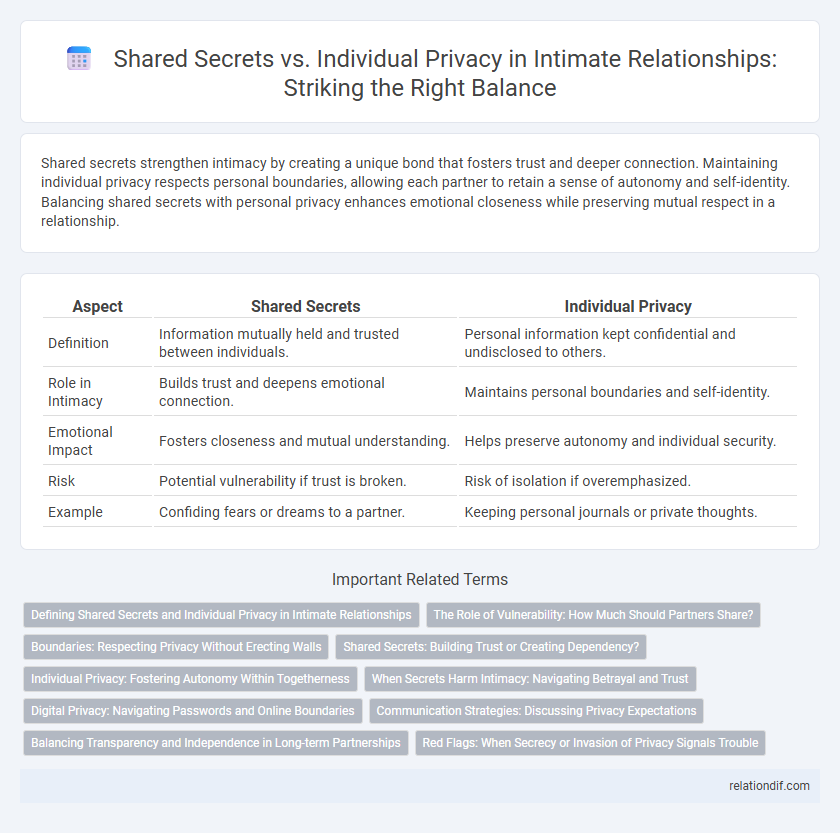Shared secrets strengthen intimacy by creating a unique bond that fosters trust and deeper connection. Maintaining individual privacy respects personal boundaries, allowing each partner to retain a sense of autonomy and self-identity. Balancing shared secrets with personal privacy enhances emotional closeness while preserving mutual respect in a relationship.
Table of Comparison
| Aspect | Shared Secrets | Individual Privacy |
|---|---|---|
| Definition | Information mutually held and trusted between individuals. | Personal information kept confidential and undisclosed to others. |
| Role in Intimacy | Builds trust and deepens emotional connection. | Maintains personal boundaries and self-identity. |
| Emotional Impact | Fosters closeness and mutual understanding. | Helps preserve autonomy and individual security. |
| Risk | Potential vulnerability if trust is broken. | Risk of isolation if overemphasized. |
| Example | Confiding fears or dreams to a partner. | Keeping personal journals or private thoughts. |
Defining Shared Secrets and Individual Privacy in Intimate Relationships
Shared secrets in intimate relationships are confidential pieces of information deliberately exchanged between partners to build trust and emotional closeness. Individual privacy, however, refers to each partner's personal boundaries regarding information they choose to keep private, maintaining a sense of autonomy and respect within the relationship. Balancing shared secrets and individual privacy fosters a healthy dynamic where intimacy thrives without compromising personal identity.
The Role of Vulnerability: How Much Should Partners Share?
Vulnerability plays a crucial role in intimacy, as shared secrets deepen emotional connection and foster trust between partners. Balancing transparency with individual privacy ensures a healthy dynamic, allowing each person to maintain personal boundaries while feeling understood and valued. The level of sharing varies by relationship, with openness tailored to mutual comfort and respect to cultivate genuine closeness.
Boundaries: Respecting Privacy Without Erecting Walls
Establishing boundaries in intimacy involves balancing shared secrets with individual privacy to foster trust without creating emotional barriers. Respecting personal space allows partners to maintain their identity while deepening connection through selective disclosure. This equilibrium supports healthy relationships by promoting openness without compromising autonomy.
Shared Secrets: Building Trust or Creating Dependency?
Shared secrets play a crucial role in building trust within intimate relationships by fostering a sense of exclusivity and mutual understanding. They can strengthen emotional bonds and create a secure environment where partners feel valued and connected. However, an overreliance on shared secrets may lead to unhealthy dependency, blurring boundaries and limiting personal autonomy.
Individual Privacy: Fostering Autonomy Within Togetherness
Individual privacy within intimacy nurtures personal autonomy by allowing partners to maintain boundaries that respect their unique experiences and thoughts. Preserving individual privacy supports emotional health and self-identity, preventing codependency while strengthening mutual trust. Balancing shared secrets and private space creates a foundation for deeper connection without sacrificing personal freedom.
When Secrets Harm Intimacy: Navigating Betrayal and Trust
Shared secrets can strengthen bonds by fostering trust and intimacy, yet when secrets harm intimacy, they often lead to feelings of betrayal and erosion of trust. The delicate balance between shared confidentiality and individual privacy requires transparency and mutual respect to prevent misunderstandings and emotional distance. Navigating these dynamics involves open communication and establishing boundaries that protect both personal autonomy and the integrity of the relationship.
Digital Privacy: Navigating Passwords and Online Boundaries
Balancing shared secrets and individual privacy in intimate relationships requires carefully managing digital privacy through strong passwords and clear online boundaries. Implementing unique, secure passwords and respecting each partner's digital space fosters trust and protects personal information from unintended exposure. Prioritizing transparent communication about online habits reduces conflicts and enhances mutual respect in the digital realm.
Communication Strategies: Discussing Privacy Expectations
Effective communication strategies for intimacy emphasize openly discussing privacy expectations to balance shared secrets and individual privacy. Couples benefit from clarifying boundaries regarding what information remains private and what can be shared, fostering trust and mutual respect. Establishing these guidelines helps prevent misunderstandings and strengthens emotional connection within the relationship.
Balancing Transparency and Independence in Long-term Partnerships
Balancing transparency and independence in long-term partnerships requires navigating the delicate tension between shared secrets and individual privacy. Maintaining open communication about personal boundaries fosters trust while allowing space for autonomy, which strengthens emotional intimacy. Prioritizing mutual respect for individual privacy alongside collective vulnerability supports sustainable, healthy relationships.
Red Flags: When Secrecy or Invasion of Privacy Signals Trouble
Shared secrets can strengthen intimacy by fostering trust, but when secrecy becomes one-sided or obsessive, it often signals underlying issues such as control or dishonesty. Invasion of privacy, including snooping or withholding personal boundaries, frequently represents red flags for emotional manipulation or disrespect in relationships. Recognizing these behaviors early can prevent erosion of trust and promote healthier communication dynamics.
Shared secrets vs individual privacy Infographic

 relationdif.com
relationdif.com